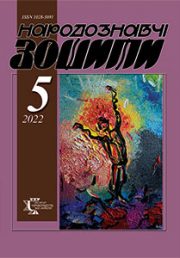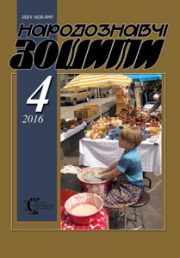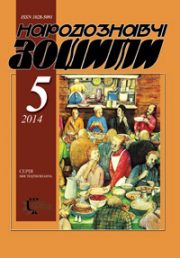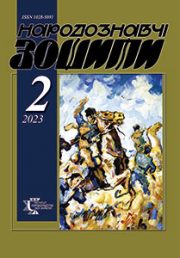The Ethnology Notebooks. 2024. № 1 (175), 109—118
UDK [94:328.1](44):355.48(470:477)”2014/2023″
DOI https://doi.org/10.15407/nz2024.01.109
SYPKO Bogdana
- ORCID ID: https://orcid.org/0000-0002-3136-9340
- Candidate of History, docent,
- The Ivan Franko National University of Lviv,
- Department of Modern and Contemporary History of Foreign Countries,
- 1, Universytetska str., 79000, Lviv, Ukraine,
- Contacts: е-mail: bogdanasypko@gmail.com
Abstract. Introduction. The Foreign Affairs Commission (Commission des affaires йtrangиres) was one of the eight permanent committees of the French National Assembly and considered issues related to the foreign policy.
Problem Statement. As it was one of the key parliamentary commissions, it was composed of more than 70 deputies representing the entire range of political forces from National Assembly of each legislature.
Purpose is on the basis of minutes of meetings, activity reports and information reports of the Foreign Affairs Commission, analyze how representatives of various political forces treated issues related to the Russian-Ukrainian war.
Methods. The general scientific methods of analysis and synthesis, as well as special scientific comparative-historical and chronological methods are used in the work. The author adheres to the principle of historicism.
Results. The analysis testifies the growing interest in the issue of the Russian-Ukrainian war. But at the initial stage (until February 24, 2022), the French deputies started from the axiom that Russia is a powerful state, a global player on the international arena, without whose energy resources the EU and especially France will not be able to function. Therefore, despite the understanding of the entire complex of Moscow’s problems, they continued to fear it and tried to establish a dialogue by any means. Therefore, assistance to Ukraine was limited to statements, some sanctions and the development of the Minsk agreements through the Normandy format of cooperation. Therefore, even if the members of the Commission expressed support for Ukraine, they emphasized France’s interest in continuing cooperation with Russia. The Foreign Affairs Commission was heterogeneous, and its members held different views. But in general, the tone of the speeches and reports of the majority of deputies is changing — more and more politicians perceive the prospect of Ukraine’s future membership in the EU and NATO, as well as emphasize the democratic values of Ukrainians. And if until February 24, 2022, Russian politicians were frequent guests of the Foreign Affairs Commission, after that it becomes a sign of a bad tone, instead, cooperation with Ukrainian parliamentarians deepened.
Conclusion. February 24, 2022 was a turning point, as for most members of the Commission, Moscow turned from a center of power into a global threat to European security. Therefore, the rhetoric about the need to find a dialogue with Russia is replaced by the leitmotif about the need to strengthen the French defense capability and help Ukraine, which is restraining this global threat.
Keywords: Foreign Affairs Commission, French Republic, National Assembly, Russian-Ukrainian war, Ukraine.
Received 2.01.2024
REFERENCES
- Sypko, B. (2023). Key theses of the Senate information report «Ukraine: the year of war. What are the lessons for France?». Historical sights of Galicia. Materials of the VIII Regional Studies Conference (Lviv, May 3, 2023) (Pp. 182—185) [in Ukrainian].
- Sypko, B. (2021). Ukrainian sovereignty through the prism of the french National Assembly’s meetings’es records. The Ethnology notebooks, 4 (160), 775—782. DOI: https://doi.org/10.15407/nz2021.04.775 [in Ukrainian].
- Sypko, B. (2023). Ukraine in the official discourse of French Republic (2014—2022). The Ethnology notebooks, 1 (169), 126—146. DOI: https://doi.org/10.15407/nz2023.01.126 [in Ukrainian].
- (2017). Information report № 4593 filed by the Foreign Affairs Commission on the activity report of the Foreign Affairs Commission under the XIV legislature (2012—2017) and presented by Ms. Elisabeth Guigou. Paris: Assemblee Nationale [in French].
- (2014). Information report № 1793 by the Foreign Affairs Commission on the French and European policy towards Russia. Registered at the Presidency of the National Assembly on February 12, 2014. Paris: Assemblee Nationale [in French].
- (2016). Information report № 3903 by the Foreign Affairs Commission on the Ukrainian crisis and the future of relations between Russia, the European Union and France. Registered at the Presidency of the National Assembly on June 30, 2016. Paris: Assemblee Nationale [in French].
- (2018). Activity report of the Foreign Affairs Commission July 2017—July 2018. Paris: Assemblee Nationale [in French].
- (2019). Activity report of the Foreign Affairs Commission September 2018—July 2019. Paris: Assemblee Nationale [in French].
- (2020). Activity report of the Foreign Affairs Commission September 2019— September 2020. Paris: Assemblee Nationale [in French].
- (2021). Activity report of the Foreign Affairs Commission October 2020—August 2021. Paris: Assemblee Nationale [in French].
- (2022). Activity report of the Foreign Affairs Commission September 2021—June 2022. Paris: Assemblee Nationale [in French].
- (2022). Report № 42 of the Foreign Affairs Commission. Closed-door hearing of Mr. Etienne de Poncins, French Ambassador to Ukraine, on the situation in this country. Wednesday May 4, 2022. Retrieved from: https://www.assemblee-nationale.fr/dyn/15/comptes-rendus/cion_afetr/l15cion_ afetr2122042_compte-rendu (Last accessed: 25.10.2023) [in French].
- (2022). Report № 3 of the Foreign Affairs Commission. Tuesday July 12, 2022. Paris: Assemblee Nationale [in French].
- (2022). Report № 1 of the Foreign Affairs Commission. Tuesday October 4, 2022. Paris: Assemble Nationale [in French].
- (2022). Opinion presented on behalf of the Foreign Affairs Commission on the draft finance law for 2023. The Army. Registered at the Presidency of the National Assembly on October 19, 2022. Paris: Assemblee Nationale [in French].
- (2022). Opinion presented on behalf of the Foreign Affairs Commission on the draft finance law for 2023. Immigration, asylum and integration. Registered at the Presidency of the National Assembly on October 26, 2023. Paris: Assemblee Nationale [in French].
- (2022). Report № 13 of the Foreign Affairs Commission. Wednesday November 30, 2022. Paris: Assemblee Nationale [in French].
- (2022). Report № 15 of the Foreign Affairs Commission. Wednesday December 7, 2022. Paris: Assemble Nationale [in French].
- (2023). Information report № 936 by the Foreign Affairs Commission on the visit of a vice-president of the Commission to Kyiv on the occasion of a meeting of presidents and vice-presidents of the Foreign affairs Commissions of several European Parliaments, on February 23 and 24, 2023. Registered at the Presidency of the National Assembly on March 8, 2023. Paris: Assemblee Nationale [in French].
- (2023). Report № 32 of the Foreign Affairs Commission. Tuesday March 7, 2023. Paris: Assemblee Nationale [in French].
- (2023). Report № 39 of the Foreign Affairs Commission. Wednesday March 29, 2023. Paris: Assemblee Nationale [in French].
- (2023). Information report № 1542 by the Foreign Affairs Commission on the policy of international sanctions. Registered at the Presidency of the National Assembly on July 19, 2023. Paris: Assemblee Nationale [in French].







